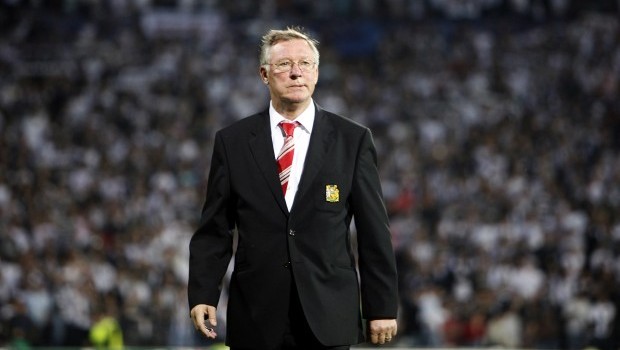
Manchester United’s manager Alex Ferguson walks before their Champions League soccer match aganist Besiktas at the Inonu Stadium in Istanbul in this September 15, 2009 file photo. (REUTERS/Osman Orsal/Files)
In 1992, a more commercialized, consumer friendly and broadcast-led Premier League was formed. Crucially, it was backed by a revolutionary marketing campaign from the satellite broadcaster Sky Television that brought glamor back to the game. In the first Premier League season, the champions were Alex Ferguson’s Manchester United; they went on to win a staggering 13 Premier League titles under his leadership. The stability and success he brought on the pitch also allowed United to fully exploit the new platform for growth the Premier League was giving its members. Old Trafford was gradually redeveloped into an all-seater stadium, the club quickly realized its brand appeal beyond Manchester and used TV exposure to increase its fan-base around the UK and the world. All of this led to growing revenue streams, allowing it to buy big name players—Frenchman Eric Cantona being the most notable.
Many English Premier League clubs have followed this business model, but United under Alex Ferguson perfected it.
United are also unique in another sense. The new hyper-commercialized Premier League has spawned teams such as Blackburn Rovers, Chelsea and now Manchester City, who have used their Premier League status to leverage huge investment to achieve rapid success. But no team has yet found their Alex Ferguson, a man who, time after time, has proven his adaptability in the modern game and created success and stability in equal measure. He has reinvented the playing squad at United at least three times, most famously in 1995 when he allowed Paul Ince, Mark Hughes and Andrei Kanchelskis to leave, replacing them with a young, inexperienced crop of youth players including David Beckham and Paul Scholes. It was a decision much mocked at the time—but an unmitigated success. The renewal was seamless; the team won the league that very same season.
He did get a few things wrong. United have had dips, and some of his signings—as one United season ticket holder told me—have been “truly awful.” Arguably, he could also have overseen more success in European competition, but overall, no manager in the modern game has stayed ahead of the competition so consistently. As Ferguson continued to evolve his team, his rivals fell by the wayside, and none more so than Arsene Wenger, the once-revolutionary Arsenal manager who now seems incapable of emulating Ferguson’s knack for reinvention; Arsenal have not won a trophy for eight agonizing years.
Alex Ferguson’s departure is not earth-shattering news. Indeed, some commentators in Britain have questioned why his resignation has led the news headlines on the day of the crucial Queen’s Speech, which outlines the British government’s legislative plans for the next year. Yet the end of Ferguson’s reign at United is big news, and not just for United fans. Premier League football is an omnipresent part of global consciousness. It has an annual global audience of almost 5 billion, more than any other sport. And if you think of the Premier League, you think of Manchester United. Think of Manchester United, and you think of Alex Ferguson. It is now time for a new Ferguson to emerge as a focal point, not just for United but for the Premier League, too, but it is far from clear whether even a Mourinho or a Moyes could fill the shoes vacated at Old Trafford this week.
